Energy Efficiency for Sustainable Development
Together with Mission Efficiency, SEforALL’s Energy Efficiency programme drives progress toward doubling the global average annual rate of energy efficiency improvements, to achieve SDG target 7.3 and Net Zero by 2050. We do this by advocating for greater commitments and actions on energy efficiency and by strengthening the enabling environment for investment in energy efficiency.
2x
annual energy efficiency improvement needed to achieve SDG7.3
7
Gt CO2 emissions reduced from doubling energy efficiency by 2030
1,800 bn
USD annual investment needed to double energy efficiency by 2030
4.5 m
additional jobs created from doubling energy efficiency by 2030
The challenge
As the global population is anticipated to reach 9.7 billion by 2050, with two-thirds expected to live in urban areas and fuelled by a projected annual economic growth rate of 3% by 2030, energy demand is set to soar with business as usual practices.
SDG target 7.3 aims to double the global rate of improvement in energy efficiency by 2030 compared to the 1.3% in the 1990-2010 period. But global progress has fallen short, exacerbated by the COVID-19 pandemic, with 2020 marking the worst improvement in the period. To get back on track, a 3.8% annual improvement for the remaining years of this decade is now necessary. For the more ambitious Net Zero Scenario, the annual improvement rate would need to exceed 4%.
Action is needed to ensure that energy efficiency is a priority in global and national agendas. It is essential to make energy efficiency opportunities highly visible and translate them into substantial commitments, actions, and investments. These commitments today will be decisive in advancing toward SDG7 and achieving net-zero emissions.
The solution
Accelerating progress on energy efficiency can decouple economic growth from energy demand, reduce reliance on fossil fuels, and advance a just and equitable energy transition. The policies and technologies needed to double energy efficiency improvements are well-known and readily available. From Minimum Energy Performance Standards (MEPS) for products, to building codes for homes and other buildings, to fuel economy standards for transport, and to energy management policies for heavy industry, energy efficiency measures have proven effective worldwide. However, the speed at which these policies are implemented, enforced, and supported by efficient technologies will depend on political commitments and tripling investments in energy efficiency to $1.8 trillion annually until 2030.
In regions where electricity access is unreliable and cooking often relies on traditional solid biomass, energy efficiency can play a crucial role in achieving a just and equitable energy transition. Enhancing energy efficiency in these areas can boost energy availability for those in need, create a more resilient and flexible energy grids, and optimize the integration of new renewable energy sources to their fullest potential.
Our Energy Efficiency programme and Mission Efficiency work across sectors and in key countries to:
Elevate energy efficiency: Advocate and convene partners at strategic forums like the G7, G20, the Clean Energy Ministerial and COP to build momentum for energy efficiency.
Support energy efficiency: Provide strategic and technical assistance to governments, organizations and businesses in select countries to enable energy efficiency progress.
Invest in energy efficiency: Match energy efficiency solutions with investors, including to channel coordinated and actionable funding through the Mission Efficiency Marketplace.
Contact us:
Efficiency@SEforALL.org
Follow:
#EnergyEfficiency
Sectors and partners of the Mission Efficiency ecosystem
- Buildings: energy efficient and sustainable buildings with the Global Alliance for Buildings and Construction, the Building Efficiency Accelerator, Zero Carbon Building Accelerator and partners
- Cities: energy efficient and sustainable cities with networks, such as C40, Global Covenant of Mayors, the World Economic Forum Net Zero Carbon Cities program and partners
- Cooling: access to efficient and climate-friendly cooling solutions for medical cold chains, healthcare facilities, agriculture, food production, and human comfort and safety with our Cooling for All programme, Cool Coalition, Clean Cooling Collaborative (formerly K-CEP)a and partners
- Energy supply: efficient and sustainable generation, distribution and transmission of energy with the District Energy Initiative, Grid Efficiency and Resilience (GEAR), Cornerstone of Rural Electrification (CORE) and partners
- Industry: efficient, sustainable and productive industries with Industrial Energy Accelerator, Mission Possible Partnership and partners
- Products: energy efficient and sustainable appliances, technologies and materials with United for Efficiency, Efficiency for Access, Motor Efficiency Global Alliance (MEGA) and partners
- Services: effective energy efficiency services with Global ESCO Network and partners
- Transport: energy efficient and sustainable mobility with Sustainable Mobility for All, Global Fuel Economy Initiative and partners
Country work
Key partner initiatives
Mission Efficiency Mission Efficiency is a collective of actions, commitments and goals from a coalition of governments, organizations and initiatives that come together to accelerate the transition towards energy efficient economies worldwide.
International Energy Agency - Energy Efficiency: Tracking global energy efficiency progress, investment, policies and providing capacity building resources.
World Bank RISE - Energy Efficiency: A snapshot of a country’s policies and regulations in the energy sector, including a pillar on energy efficiency. See country scores here.
Energy Efficiency updates
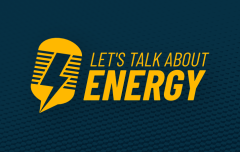
Page
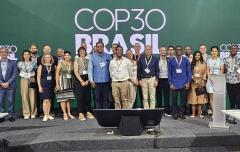
Press release
18 Nov 2025
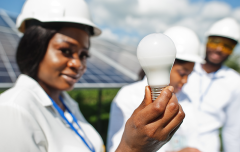
News
02 Oct 2025
News
21 May 2025
News
29 Apr 2025
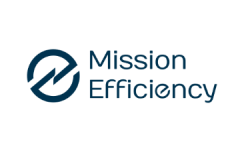
Press release
14 Nov 2024
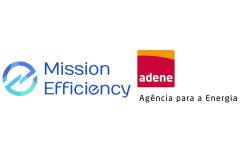
In-person
20 Sep 2024
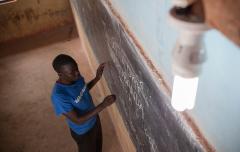
News
24 May 2024
